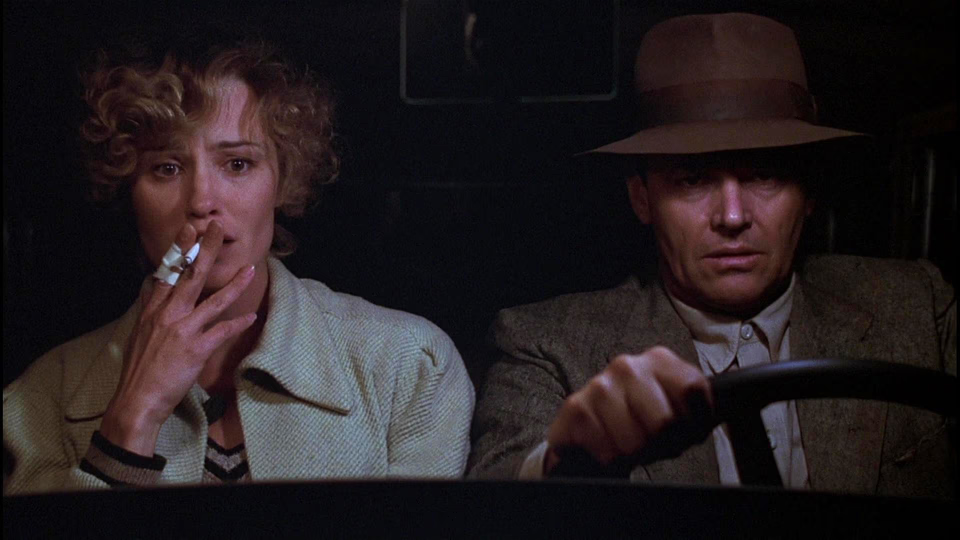The Postman Always Rings Twice

David Mamet’s screenwriting debut. Not a remake of the 1946 Lana Turner film, but another adaptation of James M. Cain’s novel. Jack Nicholson plays Frank, an opportunistic drifter who hires on at a rural luncheonette with his eye on the owner’s wife Cora, played by Jessica Lange. The two begin a torrid affair and soon they’re plotting to off her husband. Spoilers follow.
This review proves tricky. Do I write for the audience who’s seen the Turner film or the ones who’ve read the book? What about those new to the material? Or those familiar with both? Bear with me as I endeavor to cover all these bases.
First, if you’ve seen neither version, read the book. It’s a quick read, packs more cynicism than either adaptation, and while the sex isn’t as graphic as this version, it includes a sadomasochistic edge that’s expunged from the Turner version and only hinted at here.
This adaptation, directed by Bob Rafelson, nails the atmosphere. Wide shots of the luncheonette convey a sense of rural isolation. Nicholson arrives sporting unshaven stubble, dirt under his fingernails, and wearing frayed clothes. I preferred his restless performance to John Garfield’s cleaner-cut, golly-gee take in the Turner version.
Opposite Nicholson, Lange proves a stark contrast to Turner’s polished platinum bombshell. She’s sweaty, sporting shabby clothes, with minimal makeup. But I bought Nicholson’s animalistic attraction to her, and her surrender to his advances.
Mamet’s adaptation restores some elements excised from the production-code-era Turner version. Cora’s husband is Greek and the relationship between Frank and Cora includes more violence. It also restores Frank’s fling with a wildcat trainer while Cora’s out of town, though Mamet changes the setting to a circus and Anjelica Huston plays the character with a head-scratching accent that had me chortling.
Indeed, I found Mamet’s choices interesting. His adaptation hews closer to the source and eliminates the contrived plotting of the Turner version, while foreshadowing elements like the insurance and baby earlier in the narrative.
But it’s his outright changes that prove the most fascinating. For example, when Frank and Cora try to leave, instead of her abandoning him roadside because she can’t abide his low-class drifter lifestyle, Mamet has them reach a bus station only for Frank to wander into a craps game. I struggled with this decision, as the result diminishes Cora’s agency and lessens the story’s cynical edge.
The same applies, albeit to a lesser extent, to Mamet’s adaptation of the court sequence. It improves on the Turner version by retaining the backroom insurance dealings. Mamet adds a scene with Katz setting up the deal with the insurance reps. It even proffers bits of Mamet’s signature staccato shorthand dialogue. I suspect Mamet added it to avoid the novel’s large exposition dump where Katz explains everything but it costs the surprise reveal when Katz gets the case thrown out.
Further, Mamet removes the relationship between Katz and the District Attorney. In the book, the two wager a hundred bucks on the case over dinner. While one could regard this as a minor detail, it reinforces the book’s cynical view of elitism. Mamet also has Katz pocket the insurance money, unlike the book which sees Cora refuse, another change that diminishes her agency.
Like the Turner version, Mamet tries to streamline the third act. As mentioned, he restores Frank’s fling while Cora’s away, continuing the cat motif, but condenses the blackmail sequence. In another surprising change, he reveals Cora’s pregnancy far earlier than in the novel. I suspect this was a bid to soften Frank’s character and engender some emotional stakes, but again, it diminishes the inherit cynicism.
So which version is better? Both disappoint. Rafelson’s version offers more verisimilitude and hews closer to the novel, but plays like an erotic thriller that’s neither thrilling nor erotic. Turner’s version sports a Hollywood sheen that reduces the story to a contrived melodramatic romance, but has the best singular performance in Hume Cronyn’s Katz. That performance, combined with the shorter running time, gives the Turner version the edge.
That said, avoid both and read the book instead.